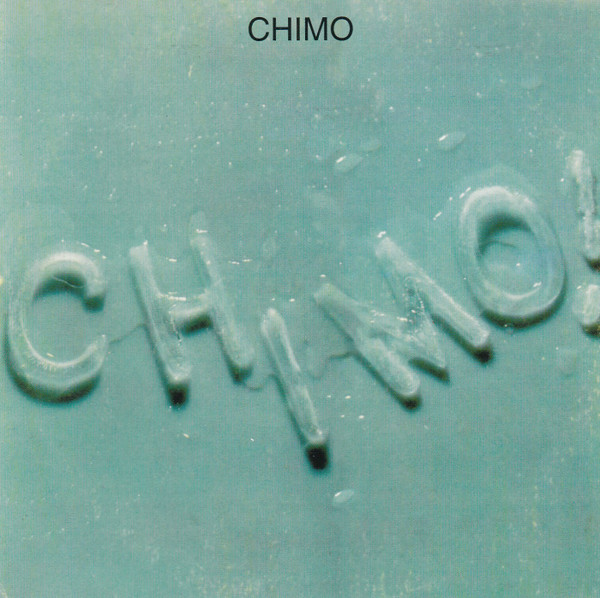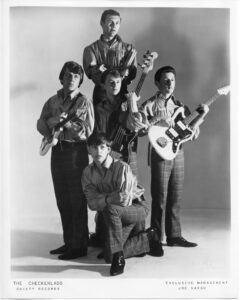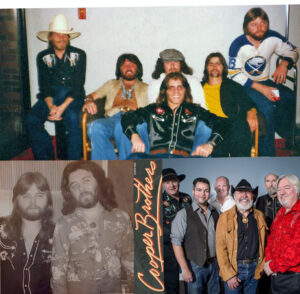Chimo
In 1966 a young David Clayton-Thomas and his group the Bossmen had a huge Canadian hit with the brilliant “Brainwashed”. Unfortunately, the bleeped language and music industry politics forced the guys from the scene, banned and blackballed. It took four more years for another Bossmen song to hit the stores at a time in rock music when four years approximated eternity.
The song in question, Clayton-Thomas’ “Quicksilver Woman”, was performed by a new Toronto group, Chimo! This band included two important members of the old band — guitarist Jack Mowbray and the brilliant jazz pianist Tony Collacott. Collacott’s extraordinary solo break on “Brainwashed” — a dark, possessed explosion in the words of jazz writer Mark Miller — remains the most arresting feature of that great record.
With the demise of the Bossmen, Collacott returned to his usual pattern of total obscurity punctuated by occasional forays into the local jazz scene. For his part, Mowbray hightailed it for Italy, where he backed pop star Nicola di Barri for six months. Upon returning to Toronto, he and his old boss reunited to form the David Clayton-Thomas Combine which also included drummer Pat Little (from Luke and the Apostles) and bassist Peter Hodgson (from Jon and Lee and the Checkmates).
After two obscure singles, Clayton-Thomas received the call from BS&T; in New York and Hodgson joined Rhinoceros in Los Angeles. Left to fend for themselves, Mowbray joined the Georgian People, an established group based in Parry Sound, Ontario.The “Georgian People” grew out of the “Georgian IV” when Mowbray and the others joined. The Georgian IV, established in late 1964, played for several years in Ontario, Quebec, and New York state, and included Ross Raby (vocals, organ, piano), John Johnson (vocals, guitar), Stewart McCann (bass), and Rick King (drums). Mowbray (guitar) was the first to join the Georgian IV, followed by Collacutt (piano), and then some time later by Pat Little (drums).
After dozens of nights spent rehearsing new original material following regular lounge gigs, the group felt confident enough to look for a label. A deal with the Revolver label flowed from a chance in-flight meeting between label-owner Mort Ross and Jack Mowbray, who was heading to New York to enlist the help of Clayton-Thomas. Along the way, Stewart McCann left and the bass playing was turned over to John Johnson, who relinquished his guitar playing to Mowbray. Rick King also eventually left and the drumming was taken over by Pat Little. Leather-lunged Breen Leboeuf was added as frontman, at Ross’s suggestion. Soon, Andy Cree replaced Pat Little on drums and later, Cree was oiut and Pat Little back in. (As an aside, during his sabbatical, Little headed south for a stint with Van Morrison; the stickwork on “Caravan” from Morrison’s Moondance album is commonly credited to him.)
The first single, the pretty “Quicksilver Woman”, attracted some notice when it was released in the Spring of 1970, but sold poorly. The second, the more complicated and characteristic “Silver Silken Melody”, did a bit better at the end of the Summer. The Chimo! album, released in the US by the large Epic label, was released to good reviews and middling sales around Christmas time. Cree left soon after recording the album, and was replaced by a returning Pat Little. The full album is included in the Pacemaker collection, along with a handful of additional sides that were either never released or released on 45 only.
This set opens with two unabashed rockers from Chimo!’s final, post-album single. Even in the face of the colossal sound of Raby’s organ intro to “Cross Country Man”, it is still Little’s hypnotic and atmospheric work that sets the tone of the group’s finest recording. Little’s own “In The Sea” follows in much the same vein. Three of the other songs date from the Bossmen days – “Quicksilver Woman”, “Time Waits For No Man” and “Procession of Mabs”. Like the rest, they tend to structural complexity, something of a feat for seven guys recording in an eight-track studio with little overdubbing. The interplay between the Collacott / Cree jazz-based axis and Raby’s full rockhouse organ is worthy of particular note.
Good as the band was, interest soon sagged and Raby and Johnson, the remaining members of the original Georgian IV, departed at the end of 1971. Collacott followed soon afterwards. Mowbray, Little and LeBoeuf continued for a while as trio, but eventually splintered to pursue separate careers in club and lounge acts. LeBoeuf went on to work with Southcote and the toughest version of Montreal’s legendary Offenbach, and Little did time in Diamondback with Mike McKenna of Mainline and Scott Cushnie (who played wit everyone from Ronnie Hawkins to Aerosmith.) Mowbray settled comfortably into a duo act with his wife, far away from the hard and progressive sounds of his past.
Early Chimo! promotional material pointed out that the name is an Inuit greeting that says hello, brotherhood, peace. Nobody bothered to mention that it can also mean good-bye.
Liner notes by Bill Munson with thanks to Jack Mowbray and Stewart McCann
Along the way, Stewart McCann left and the bass
laying was turned over to John Johnson, who relinquished his guitar
playing to Mowbray. Rick King also eventually left and the drumming was
taken over by Pat Little. Soon, Andy Cree replaced Pat Little on drums.
Breen LeBoeuf (vocals) also was added. Later, Cree was replaced by Pat
Little.




